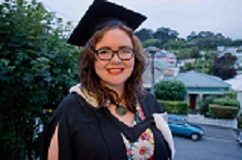LALS Prize Winners 2014
Congratulations to LALS Prize Winners 2014
Rebecca White—Applied Linguistics Prize

I went into the Masters of Applied Linguistics programme hoping for new learning experiences after two years of teaching in Europe. As it turns out, the Masters programme was just as stimulating, challenging and fulfilling as my time overseas. The range of papers on offer meant I could work on gaps in my abilities as a language teacher, such as teaching pronunciation or the systems of English grammar, and at the same time learn more about contemporary applied linguistics theory, including sociocultural theory and factors underlying second language acquisition. I was also introduced to principles of applied linguistics research methodology, which made me view all forms of enquiry in an entirely new way. It was this focus on research methodology within the programme that gave me the confidence to do my own research project under the supervision of Dr Averil Coxhead, in the area of first language vocabulary acquisition. The whole Masters undertaking proved to be a great experience in learning through doing, and I’d like to thank LALS for the opportunity.
Elvenna Majuddin—English Speaking Union Award
Shelley Dawson—English Speaking Union Award

Studying for my Masters in ALIN has been a memorable, challenging, and not least stimulating learning journey. Having been teaching for thirteen years I relished the opportunity to take on the role of student again and to explore my own teaching and learning experiences in greater depth, nailing down some of my tentatively formed hypotheses, questioning others, and coming time and time again to the conclusion that yes, it does depend on context. The support and encouragement from all of my tutors (Meredith Marra, Frank Boers, Peter Gu, and Kieran File) was a major part of this positive experience.
I’d like to thank Meredith, in particular, for her supervision during my final research dissertation which investigated Bonny Norton’s central concept of identity. Through a primarily discourse analytic approach I was able to uncover some of the micro processes involved in the actual ‘doing’ and co-construction of different identities in a classroom setting, as well as investigate guiding factors in this construction. Sitting at the crossroads of Applied Linguistics and Sociolinguistics and using a relatively new methodological approach resulted in a meaningful, if at times overwhelming, learning experience. Throughout, Meredith’s support and faith in my research abilities was unflinching; our regular meetings provided both academic stimulation and much appreciated encouragement. I would also like to thank my wonderful participants, all busy students and teachers, without whom this research experience would have been decidedly less rich.
Sophie Barr, Emily Greenbank, Kaitlyn Smith—Ian Gordon Prize

Before my first linguistics lecture, I had no idea what it was. I was taking linguistics because it was the only arts paper that fitted in my timetable while I was studying a conjoint degree in Economics and English. And now I am a linguistics evangelist. My undergraduate and honours degrees provided me with a lens through which to view the world - through the systematic, yet creative phenomenon of language; a trait that makes us so uniquely human. Further research in linguistics is always bountiful as new contexts constantly arise, whether it be from immigration or a social media craze, which affects the way we communicate. I am currently teaching English in a secondary school in a low-income community of South Auckland where there are real language deficits. My studies in linguistics have provoked me to question why have these language-deficit occurred? And how will this impact their learning, both currently and in the future? But perhaps the most important question I can ask is: how can I use my skills and knowledge to help make a positive change? They say all things happen for a reason. Thank goodness linguistics was the only arts paper that fitted into my timetable.
Isabelle Lomax-Sawyers—Linguistics Prize

I was drawn to Linguistics because I find language fascinating - the bits it's made up of, how they fit together, who uses it and why. It was a privilege to study it at Victoria, where every lecturer and tutor was also a bit of a "LING nerd" and was excited to share their area of interest with me and other students. The thing I enjoyed most about doing Linguistics was that from early on in the degree there were opportunities to do independent research into real topics, collecting and analysing real data. As a result, I have a thorough grounding in research processes, academic writing and study skills, and have had numerous opportunities to learn and apply linguistic theories and analytic techniques. In 2015 I'm applying to study medicine. The skills and knowledge I gained while studying at LALS will make me a better med student - and eventually (hopefully) a better doctor.
Joel Taylor—Sociolinguistics Prize
